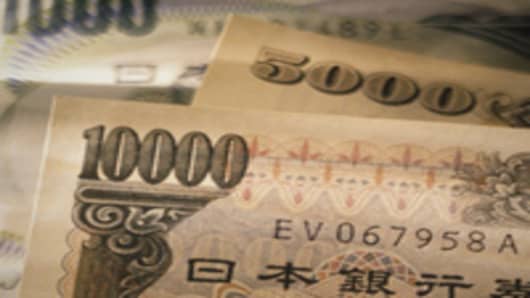Japan’s yen, which hit a one-month low against the U.S. dollar on Thursday, could plunge at least 14 percent by the end of the year as investors exit Japanese government bonds, according to Ed Ponsi, Managing Director of Barchetta Capital Management.
The yen weakened as low as 79.34 per U.S dollar on Thursday as investors pushed the dollar higher on a scaling back of expectations for U.S. monetary easing.
Ponsi said that Japan’s currency could weaken to 90 against the dollar by end of the year, in a move that could take the yen to levels not seen since June 2010.
Japanese government bond yields are looking relatively less attractive compared to their U.S. peers and this is likely to encourage investors to sell the yen and move funds back to the higher-yielding assets, Ponsi said, added that the yen could be a “huge loser.”
“I think you’re seeing a big differential, a big spread is beginning to take place between Japanese and U.S. 10-year and 2-year (government bonds). And what that’s doing is, it’s starting to pull money out of Japan and into the U.S.,” Ponsi told CNBC Asia’s “Squawk Box” on Thursday. “I think the dollar-yen is going to be in the low 80s very soon, and it could be in the 90s by year end.”
On Thursday, U.S. two-year and 10-year Treasurysare yielding 0.29 percent and 1.85 percent respectively and the payout on Japanese two and 10-year government bonds are 0.1 percent and 0.87 percent, respectively.
Paul Mackel, Head of Asia Currency Research at HSBC in Hong Kong said investors are scaling back their expectations of further quantitative easing by the U.S. Federal Reserveand that’s making the U.S. dollar more attractive at the expense of Japanese currency.
“There is definitely some momentum building for the yen to weaken, and the next threshold is 80,” Mackel said.
For the yen to weaken to 90, however, the Federal Reserve would need to raise interest rates, further driving capital out of Japan, analysts said. This, however, is unlikely to happen any time soon as the U.S. economy remains weak and the Fed has committed to keeping benchmark rates in the zero to 0.25 percent range until at least 2014, Mackel said.
In the meantime, U.S. Treasury yields could continue rising and draw capital away from Japan, he added.
While a weaker yen is good for Japanese exporters, who have could see orders spike as their goods become cheaper, it remains to be seen if this trend is sustainable, Warren Hogan, Head of Economics and Interest Rate Research at ANZ Bank in Sydney said.
Yen strength against the dollar this year has caused a headache for Japan’s policy makers, who have faced pressure from businesses to stem a strong currency.
“The Japanese authorities would love to hear that (the yen weakening to 90s),” Hogan told CNBC. “But I think we got to see the U.S. yields go up to sustain that capital flows. You got to take a pretty strong bearish view on Treasurys, I think.”
- By CNBC's Jean Chua.


